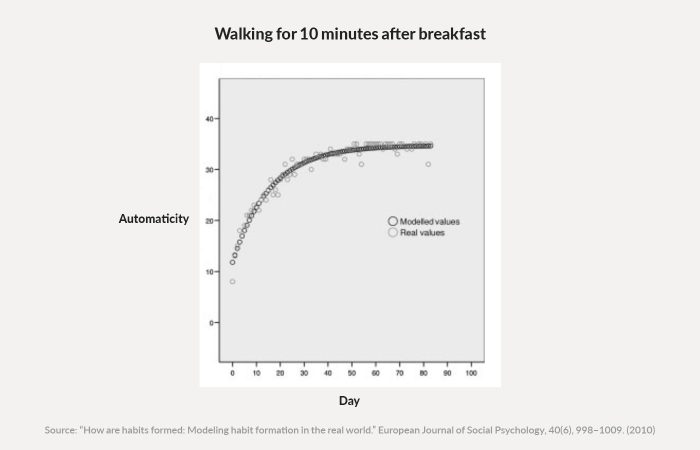The scientific argument for mastering one thing at a time
It's all about implementation intentions and automaticity


A free daily email with the biggest news stories of the day – and the best features from TheWeek.com
You are now subscribed
Your newsletter sign-up was successful
Many people, myself included, have multiple areas of life they would like to improve. I'd like to reach more people with my writing, lift heavier weights at the gym, and start practicing mindfulness more consistently. Those are just a few of my many goals. You probably have a long list, too.
The problem is, even if we are committed to working hard on our goals, our natural tendency is to revert back to our old habits at some point. Making a permanent lifestyle change is really difficult.
Recently, I've come across a few research studies that (just maybe) will make these difficult lifestyle changes a little bit easier. As you'll see, however, the approach to mastering many areas of life is somewhat counterintuitive.
The Week
Escape your echo chamber. Get the facts behind the news, plus analysis from multiple perspectives.

Sign up for The Week's Free Newsletters
From our morning news briefing to a weekly Good News Newsletter, get the best of The Week delivered directly to your inbox.
From our morning news briefing to a weekly Good News Newsletter, get the best of The Week delivered directly to your inbox.
Too many good intentions
If you want to master multiple habits and stick to them for good, you need to figure out how to be consistent. How can you do that?
Research has shown that you are two to three times more likely to stick with your habits if you make a specific plan for when, where, and how you will perform the behavior. For example, in one study, scientists asked people to fill out this sentence: "During the next week, I will partake in at least 20 minutes of vigorous exercise on [DAY] at [TIME OF DAY] at/in [PLACE]."
Researchers found that people who filled out this sentence were two to three times more likely to actually exercise compared to a control group who did not make specific plans for their future behavior. Psychologists call these specific plans "implementation intentions" because they state when, where, and how you intend to implement a particular behavior.
A free daily email with the biggest news stories of the day – and the best features from TheWeek.com
This finding is well proven, and has been repeated in hundreds of studies across a broad range of areas. For example, implementation intentions have been found to increase the odds that people will start exercising, begin recycling, stick with studying, and even stop smoking.
However (and this is crucial to understand) follow-up research has discovered implementation intentions only work when you focus on one goal at a time. In fact, researchers found that people who tried to accomplish multiple goals were less committed and less likely to succeed than those who focused on a single goal.
What happens when you focus on one thing
When you begin practicing a new habit, it requires a lot of conscious effort to remember to do it. After awhile, however, the pattern of behavior becomes easier. Eventually, your new habit becomes a normal routine and the process is more or less mindless and automatic.
Researchers have a fancy term for this process called "automaticity." Automaticity is the ability to perform a behavior without thinking about each step, which allows the pattern to become automatic and habitual.
But here's the thing: Automaticity only occurs as the result of lots of repetition and practice. The more reps you put in, the more automatic a behavior becomes.
For example, this chart shows how long it takes for people to make a habit of taking a 10-minute walk after breakfast. In the beginning, the degree of automaticity is very low. After 30 days, the habit is becoming fairly routine. After 60 days, the process is about as automatic as it can become.

The most important thing to note is that there is some "tipping point" at which new habits become more or less automatic. The time it takes to build a habit depends on many factors, including how difficult the habit is, what your environment is like, your genetics, and more.
That said, the study cited above found the average habit takes about 66 days to become automatic. (Don't put too much stock in that number. The range in the study was very wide and the only reasonable conclusion you should make is that it will take months for new habits to become sticky.)
Change your life without changing your entire life
- You are two to three times more likely to follow through with a habit if you make a specific plan for when, where, and how you are going to implement it. This is known as an implementation intention.
- You should focus entirely on one habit. Research has found that implementation intentions do not work if you try to improve multiple habits at the same time.
- Research has shown that any given habit becomes more automatic with more practice. On average, it takes at least two months for new habits to become automatic behaviors.
This brings us to the punchline of this article…
The counterintuitive insight from all of this research is that the best way to change your entire life is by not changing your entire life. Instead, it is best to focus on one specific habit, work on it until you master it, and make it an automatic part of your daily life. Then, repeat the process for the next habit.
The way to master more things in the long-run is to simply focus on one thing right now.
This article was originally published at JamesClear.com. To get more self-improvement ideas based on proven scientific research, join his free newsletter.
James Clear writes about how to build better habits and improve performance. Over 1 million people read his website each month and more than 315,000 subscribe to his popular email newsletter. His work has been featured by TIME, Entrepreneur, Forbes, Fast Company, and many other major media outlets. To read more of his writings on self-improvements tips based on proven scientific, visit JamesClear.com.
-
 What to watch out for at the Winter Olympics
What to watch out for at the Winter OlympicsThe Explainer Family dynasties, Ice agents and unlikely heroes are expected at the tournament
-
 Properties of the week: houses near spectacular coastal walks
Properties of the week: houses near spectacular coastal walksThe Week Recommends Featuring homes in Cornwall, Devon and Northumberland
-
 Will Beatrice and Eugenie be dragged into the Epstein scandal?
Will Beatrice and Eugenie be dragged into the Epstein scandal?Talking Point The latest slew of embarrassing emails from Fergie to the notorious sex offender have put her daughters in a deeply uncomfortable position
